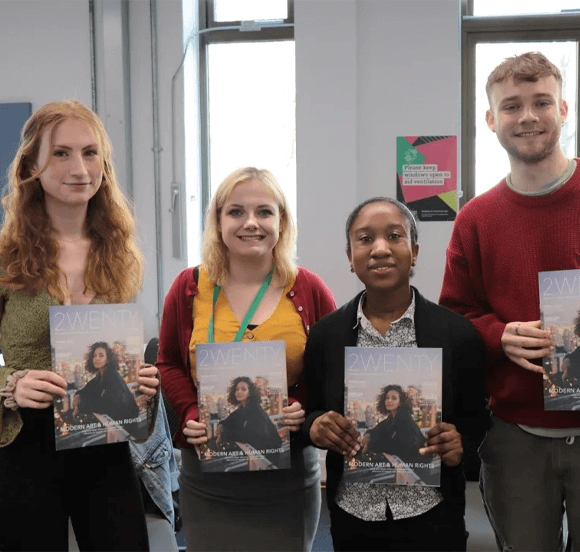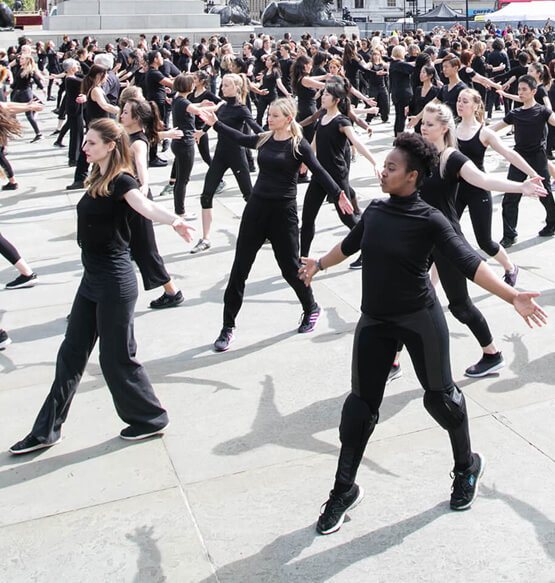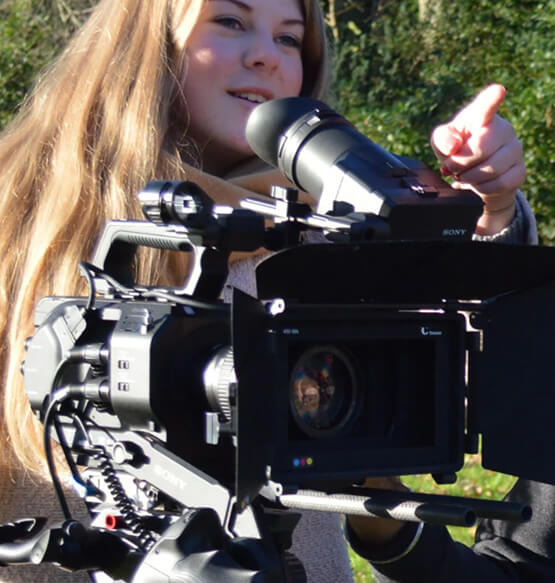You'll need:
112–128 UCAS points (or equivalent)
Foundation Year: 64–80 UCAS points (or equivalent)
International Foundation Pathway:
64 UCAS (or equivalent)
IELTS: 5.5
UCAS Code:
P500
P501 (if choosing Foundation Year)
Start date(s):
September 2026
Step into the future of storytelling with our BA Journalism.
Study a degree that reflects the profound changes in the creative industries. Graduate as a multi-skilled content creator with an industry-accredited degree.
The media landscape is always evolving, and we’ll make sure you’re ready for what’s next, with training guaranteed to meet industry standards. In a fast-moving global landscape, where social change and new technologies constantly reshape how we communicate, you’ll learn to stay ahead of the way audiences connect and engage.
You’ll create high-value content across a wide range of genres and subjects for different multimedia platforms, from print and photography to radio, video and social media. You’ll be guided by industry professionals, operating alongside the leading industry body whose members publish titles ranging from Vogue and GQ to Heat magazine.
Accredited by The Professional Publishers Association
This PPA-accredited Journalism programme meets industry standards and connects you with a leading professional body whose members publish titles like Vogue, GQ and Heat. You’ll receive hands-on training from industry professionals in feature writing, magazine production, social media, podcasting and video.
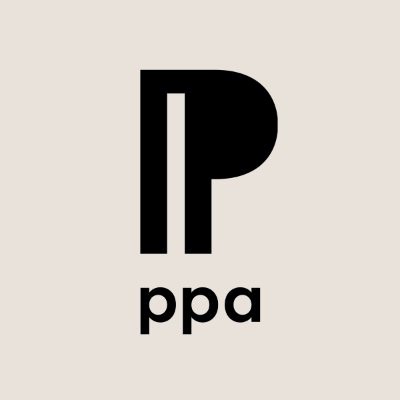

Create journalism that speaks to who you are
We are committed to choice, self-expression, and diverse stories. Uniquely at Roehampton, you’ll create media content shaped by your experiences, interests, and career goals, while amplifying the histories, lives and aspirations of the communities that matter to you.
Modules
Module overview:
Digital technology has changed the way news is produced, packaged, distributed, consumed and used by readers and audiences.
This module will introduce you to the media business environment, providing a grounding in how the online news and social media industries operate. You will look at how media and communication work to influence society and the way we live our lives.
It focuses on the ways that digital technology affects the media production, while providing a grounding in news media analysis. The module will introduce you to debates about online news and social media, considering their possibilities and challenges.
How you'll learn:
You will learn through lectures and workshops. Lectures will cover the key learning material, key for sustainability, global engagement and professionally focused education. Workshops will consist of sessions where the material will be discussed in depth with the use of case studies, including student reviews and marketing of reports.
How you'll be assessed:
You will be assessed by a social media blog (30%) and an essay/report (70%).
Module overview:
Start the journey to becoming journalists and content creators. Guided by professionals, you will learn some of the secrets of the trade. You will discover how to access relevant sources and conduct interviews. You will also start to learn about how journalism works and what it involves.
This module introduces you to the media industry and the culture, traditions and achievements of journalists in Britain and the world. You will also learn to research, prepare and conduct interviews, and select news for the design of a newspaper’s front page.
How you'll learn:
You'll learn through either weekly lectures or workshops and some weeks will have extra small group learning. There will be time for individual tutorials. Lectures will cover the key learning material, key for sustainability, global engagement and professionally focused education.
The sessions will be highly interactive, with frequent class debates on key topics such as the freedom of the press, media ownership and the social and cultural influence of tabloid journalism.
Module overview:
This module equips you with the skills to create visual projects (photos and videos) for storytelling purposes. We encourage you to explore and experiment with a wide range of practices and techniques, including DSLR camera operation, lighting, composition, digital editing and post-production using industry-standard Adobe software.
The module introduces you to the languages, grammar, conventions, and techniques of digital video and stills production for online media. It provides the knowledge and skills required to work independently, creatively, and efficiently, either individually or as part of a small, budget-conscious crew on a short video project or photo shoot.
In this shared module, you may produce photos and videos from a journalism, media marketing, or creative perspective.
How you'll learn:
You'll learn through a combination of sessions designed to enhance learning and skill development. There will be a one hour lecture on some weeks and four hours of workshop teaching. On other weeks, additional small group learning sessions will be provided. Lectures will cover key learning material, focusing on sustainability, global engagement, and professionally oriented education. There will be time for individual tutorials.
How you'll be assessed:
The module assessment consists of two components: Photo Reportage and Video Project
Module overview:
You will develop your news writing and reporting skills, starting with finding out how to identify newsworthy events. You will gain a working knowledge of Britain's most important institutions, so you can make use of them for sources. You will learn how to write stories that deliver the critical information that readers need.
In Newsmaking, you learn about the traditions, conventions and narrative strategies of news writing and reporting, and develop the ability to identify newsworthy events and facts. You locate, contact and interview relevant sources, and obtain facts, figures and contextual information from public reports, press releases, media stories and databases. You research, write, edit and proof-read your own news stories. At the same time, the module provides you with a basic working knowledge of Britain’s most important institutions at national and local level as sources for stories. You will also discuss current affairs.
How you'll learn:
You'll learn through a weekly two hour interactive lecture and three hour seminar or workshop, plus one hour of individual tutorial (divided in two sessions of 30 minutes each), as well as more individual tutorials in Week 12. There will be time for individual tutorials.
How you'll be assessed:
This module will be assessed using a Portfolio of journalistic work and an Editorial Task.
These are the current planned modules on this course and may be subject to change.
Module overview:
This module will teach you the craft of feature writing.
Anyone working in journalism or related communications fields will be expected to have a good grasp of how features are produced, packaged and promoted. The Art of the Feature will teach every aspect of the process, from coming up with original ideas to finding the right sources to professional-standard execution. The course is highly practical, with a different aspect of the process being taught each week and with extensive time devoted to exercises designed to hone your writing, reporting and researching skills.
You will learn how to produce work aimed at specific audiences. The focus will be on reporting and writing, but students will also learn how to package their work for digital and print publications. They will produce original text feature articles that incorporate images and hyperlinks, along with social media posts to promote them.
You will first learn about the main types of features and the websites, magazines and other publications that publish them. You will then learn, via lectures and workshops, about idea generation, reporting, incorporating images, and, of course, writing. The goal will be to learn how to produce compelling multimedia work for a target audience.
In line with the module’s focus on targeting audiences, you will also learn about the journalism industry, researching prospective companies that you can pursue for work placement opportunities in your third year.
How you’ll learn:
You’ll have a weekly lecture and workshops, plus time for individual tutorials. Lectures—available at least 48 hours in advance—cover key material, while workshops build your research and writing skills through team tasks, peer feedback, and project reviews.
Each week, you’ll focus on a different aspect of feature writing, applying techniques in structured, hands-on sessions. You’ll also get the chance to share ideas with third-year students who’ve previously taken the module.
Module overview:
Interested in travel, sport, fashion, film, music and lifestyle? You will produce reviews, features and profiles to build a portfolio in the area of your choice. You will examine the role of content creators in some of today’s major debates, from the environmental impact of the fashion industry to corruption in sport. You will learn how copywriters create content that enables individuals, companies and organisations to communicate their message to the wider world.
Copywriting is about communicating the benefits of any product or service to its potential audience, and the skills that you will learn will empower your writing as either a professional copywriter or a content creator who is keen to maximise the impact of your written work.
Global industries depend on media specialists to communicate with the public, with other businesses, with local and national governments, with international organisations, and with their own employees. Content creators and copywriters perform a wide range of roles, both inside and outside an organisation, to facilitate the public’s access to information about products, services, and the organisation’s own functioning, decision-making and performance. They possess a remarkable professional mobility and adaptability, often moving seamlessly from one role to other, from outside a company to inside it, from journalism to PR, or from copywriting to journalism.
In each position they display a common set of skills: excellent professional writing, the ability to produce content in a variety of genres, formats and platforms, and the ability to evaluate, assess and summarise complex information. These are the skills you will develop.
How you’ll learn:
You’ll learn through a weekly mix of interactive lecture and seminar. There will be time for individual tutorials. Lectures will cover weekly topics, while seminars will consist of student-centered workshops. There will be an additional 30 minutes of asynchronous digital support per week. This will consist of online content.
Module overview:
This module examines the evolution of radio and podcasting as powerful audio formats for storytelling. You will develop or build upon your skills by creating your own audio pieces. Alongside practical experience, you will be encouraged to cultivate a critical understanding of the radio and podcast industry, exploring its history, genres, and associated practices.
The module emphasises audio storytelling techniques, providing you with opportunities to deepen your understanding of its unique forms and practices. Additionally, you will reflect on how audio storytelling complements or contrasts with other forms of journalism, enhancing your ability to engage diverse audiences.
How you’ll learn:
You’ll learn through a weekly mix of a lecture, workshop, and practical workshop, with some weeks including small group sessions. You’ll also have up to 10 hours of one-to-one tutorials over the term.
Lecture materials will be shared 48 hours in advance so you can use tools like immersive readers and summarising apps. Workshops will explore case studies, podcast assessments, and key practical skills. You’ll also get 30 minutes of weekly asynchronous support with resources on report writing and audio production.
Module overview:
Any time that you produce media, you face the potential danger of libel or contempt of court charges. Learning how to produce journalism and other forms of content that are legally safe is an essential skill for any aspiring content creator. The ethical dimensions of content creation will also be explored, including the extent to which people have rights to privacy in a digital age.
This module fits into the context of the programme by providing a key aspect of the programme for PPA accreditation – the legal knowledge required by the body – provided in a form previously approved by the body. Alongside that, it offers an understanding of regulatory frameworks, required by the body. And sets this within the context of an appreciation for you of those ethical dilemmas that content providers face.
How you’ll learn:
You’ll take part in a weekly 1-hour lecture and a 4-hour workshop. Lectures will cover key legal, regulatory, and ethical issues relevant to journalism, and will be available 48 hours in advance so you can use tools like immersive readers and AI podcast generators to support your understanding.
You’ll also receive 30 minutes of weekly asynchronous support, including revision materials, essay tips, and a mock test. Tutorials are available throughout the term.
Module overview:
This module provides an opportunity for an optional work placement year between the second and third year of the degree.
This module is available as an option to all students studying on the listed programmes. This one-year (sandwich year) module is additional to the 360 credits of a 3-year degree programme.
Participating in a work placement year will enable you to develop employability skills across a longer period. It thus complements and builds on the employability skills developed through the curriculum throughout the first two years of the degree programme.
These are the current planned modules on this course and may be subject to change.
This course offers all students the option of a one-year paid work placement, to boost your employability even further. If you choose this route, you will take the placement following year two of your course, and then return to complete your degree.
Why take a placement?
A placement year is the perfect opportunity to gain valuable work experience, to build on the career skills we will teach you on this degree. The connections you make on the placement will improve your career prospects further, and equip you with the skills you need to secure graduate-level employment.
How we support you
The University's Placement and Work Experience Team are experts at helping you to secure a placement. They will work closely with you from the start, helping you research potential employers, discover placement opportunities, create and pitch your CV, and will coach you to perform well in interviews. We aren't able to guarantee a placement, but our sector-leading advisors will give you the best possible chance of securing one.
Find out more about how we'll support you
We understand that your plans might change once you start your programme. If you decide not to do a placement, you will have the option of completing the three year version of your programme.
Whatever your choice, you will have access to many opportunities for work experience through our Placement and Work Experience Team, and access to face-to-face and 24/7 online careers support.
Module overview:
You will learn to conduct investigative journalism. The module teaches you how to use data and information to enhance your stories. You will learn about the relationship between investigative reporters and their sources of information, as well as the controversies in which they sometimes find themselves.
How you’ll learn:
You’ll take part in a weekly 2-hour interactive lecture and a 3-hour seminar or workshop. Across the first nine weeks, you’ll also have two 30-minute one-on-one tutorials. The final three weeks will focus entirely on production workshops.
Outside of class, you’ll read set texts, complete prep tasks, and work on individual and team projects, which will involve in-depth reporting and significant online research beyond campus.
Module overview:
Multimedia Production will prepare you to work in the journalism and communications industries by teaching you about the media marketplace, media brands, product design and how new ventures are launched. You will have the chance to come up with your own original ideas for a new project and you will then develop those ideas into fully formed plans.
This is a practice-based module. You will have the option of working individually or in teams as you begin the journey from the spark of an idea to the moment of product lift-off.
You will conduct research on the market environment for your proposed products while developing plans for original content, audience engagement and business strategies. The ultimate objective will be to produce professional-standard multimedia journalism that is audience-focused and commercially viable. You will learn from staff with professional media experience. There will also be sessions with guest experts and practitioners in magazine and website design, social media, media production across multiple platforms, editorial planning, and other operational aspects of the media business.
Teams will be able to design digital and print magazines, with original text, images, audio and video content. Students who work individually will develop plans for a content-rich website targeted at a specific audience or community. At the end of the module, you will present your plans to a panel of professionals, who will give feedback that can be incorporated in a follow-up module in the spring semester.
Multimedia Production will teach media-specific and transferrable skills for a range of jobs in the communications industries. You will learn how to use industry tools such as InDesign, how to develop your audio-visual skills and how to create media marketing material based on industry practice.
How you’ll learn:
You’ll have lectures and workshops, plus time for individual tutorials. Lectures, available 48 hours before class, cover key media business topics, while workshops focus on building your skills in media, product design, and development.
Module overview:
This module will prepare you for the media world. You will learn about how the industry is changing and adapting to new technology. You will consider such issues as what impact artificial intelligence will have as you and your fellow students enter the creative industries.
The demands to produce and distribute media and news faster via more speedy mobile networks and more powerful mobile devices have reshaped journalism and the creative industries. Artificial Intelligence (AI) and social media are among the main drivers transforming content production.
This module is geared towards providing a deeper awareness of the changing media industry from both an academic and professional viewpoint. You will learn about critical developments and transformations in industry practices, providing an appreciation of issues and concepts that will be vital if you wish to thrive in your chosen workplace.
How you’ll learn:
You’ll have lectures and workshops each week, plus time for individual tutorials. Lectures, available 48 hours before class, cover key graduate skills, professional education, and tech-enhanced learning. You’ll use AI tools like immersive readers and summarizers to help understand the material.
Workshops will deepen your understanding through case studies and experiential learning. The second workshop will focus on developing skills like presentation and report writing. You’ll also get asynchronous support and practice marking past reports using assessment guidelines, discussing feedback to improve your work.
Module overview:
In Journalism Project, you will deepen and broaden your creative and technical skills as you develop an original media product. This is a follow-up to Multimedia Production, a module that calls on you to design, plan and pitch a new product proposal.
You will have the option of working individually or in teams. Those working in teams will build and launch a new digital and print magazine brand. Students working individually will create a content-rich website populated with original multimedia work. In both cases, the objective will be to produce professional-standard journalism that is audience-focused and commercially viable.
Each week will focus on a different aspect of the production process. This will include editorial planning, content creation across multiple platforms, audience engagement and social media. Each week will feature workshops aimed at creating the space for collaboration. As the weeks unfold, you will gain valuable skills in project management, teamwork and organisation, as well as media-specific skills in magazine and website design, audio-visual production, packaging and repurposing content, and social media-based promotion. Content formats, styles and platforms are constantly changing, and this module is designed to reflect these changes.
The module will conclude with a launch presentation to a panel of media professionals and staff, where you unveil your new products.
How you’ll learn:
You’ll have lecture/discussion and workshops each week, plus time for individual tutorials. Lectures, available 48 hours before class, cover key media business topics. Workshops help you build skills in product design and development through peer learning and team exercises.
Each week, you’ll explore different media business areas—from how magazines and websites operate to researching competitors and creating industry-standard marketing materials. You’ll study case examples, hear from industry experts, and conduct your own market research by engaging with media professionals.
Module overview:
This module provides you with the opportunity to gain work experience as part of their studies. The work experience should be relevant to the student's current career aspirations and should therefore be sourced by the student and confirmed as appropriate before the Spring module begins. If a placement has not been approved by the start date, the student will have to take a different module.
The student should complete between 80-100 hours of work. The work experience can be in any format, such as volunteering, paid, placement, or internship, as long as this is relevant to their subject of study. The module provides an important opportunity to gain insight into a career path of interest, put valuable experience on to your CVs and inspire them to apply for appropriate graduate employment in future.
You can also pursue the development of their own business during this time, providing this is agreed with the module convenor.
These are the current planned modules on this course and may be subject to change.
This course offers a foundation year, which takes place at the beginning of your studies. Studying a foundation year will give you academic and practical experience, and a strong introduction to your subject, ensuring you succeed on your undergraduate degree.
30 credits
You will develop your core academic and integrated English language skills of speaking, listening, reading and writing. You will become familiar with key academic skills and concepts, such as referencing methods and awareness of academic integrity and tone. You will apply these skills and knowledge to both broad topics and also your chosen subject pathway.
Teaching and learning
You will be required to actively engage in on-campus learning for up to 10 hours a week.
You will be taught through a full range of teaching and learning methods, which include lectures, seminars, workshops, discussion groups, group directed tasks and presentations. This will enable you to learn from your peers and tutors in both structured and information settings.
You will be encouraged to think creatively about your approach to learning and discussions with your peers. You will also have access to recordings, resources, links and signposting through Moodle to enrich your learning.
Assessment
You will be assessed through group and individual presentations, comparative and reflective essays, multiple choice exams, coursework and reports, oral exams, portfolios, case studies and blogs.
30 credits
You will develop your core academic and integrated English language skills of speaking, listening, reading and writing. You will become familiar with key academic skills and concepts, such as referencing methods and awareness of academic integrity and tone. You will apply these skills and knowledge to both broad topics and also your chosen subject pathway.
Teaching and Learning
You will be required to actively engage in on-campus learning for up to 10 hours a week.
You will be taught through a full range of teaching and learning methods, which include lectures, seminars, workshops, discussion groups, group directed tasks and presentations. This will enable you to learn from your peers and tutors in both structured and information settings.
You will be encouraged to think creatively about your approach to learning and discussions with your peers. You will also have access to recordings, resources, links and signposting through Moodle to enrich your learning.
Assessment
You will be assessed through group and individual presentations, comparative and reflective essays, multiple choice exams, coursework and reports, oral exams, portfolios, case studies and blogs.
30 credits
You will develop your research, numeracy and information technology skills. You will investigate the difference between primary and secondary research, conduct your own research project and demonstrate your findings through data analysis. You will also develop your awareness of equality, diversion and inclusion in the UK, through a real-world issue; discrimination in the workplace.
Teaching and learning
You will be required to actively engage in on-campus learning for up to 10 hours a week.
You will be taught through a full range of teaching and learning methods, which include lectures, seminars, workshops, discussion groups, group directed tasks and presentations. This will enable you to learn from your peers and tutors in both structured and information settings.
You will be encouraged to think creatively about your approach to learning and discussions with your peers. You will also have access to recordings, resources, links and signposting through Moodle to enrich your learning.
Assessment
You will be assessed through group and individual presentations, comparative and reflective essays, multiple choice exams, coursework and reports, oral exams, portfolios, case studies and blogs.
30 credits.
This module invites you to take on the role of a video content creator, building on the skills acquired in Fundamentals of Image Making. You will examine the dynamic world of social media as news, with a particular focus on the theme of "identity." You will explore the impact of distributed media, examining how non-professionals contribute to shaping new media practices through platforms like YouTube, TikTok and Instagram.
Throughout the module, you will critically engage with the history and implications of self-promotion on social media, analysing its influence on society and the efforts to address its challenges. You will also explore citizen journalism, where social media content plays a pivotal role in reporting on crises and events inaccessible to traditional news outlets.
Teaching and learning
In weekly seminars, you will explore citizen journalist strategies – from video blogging to video editing – for creating engaging media content. Alongside these hands-on activities, you will engage deeply with thought-provoking questions about identity, voice, and representation in the digital age.
By the end of the module, you will have the skills to create compelling video content and a nuanced understanding of the role of social media in shaping our world.
The teaching delivery for each module consists of one, one-three-hour lecture and one, two-hour workshop per week. Lectures will provide a critical foundation, introducing key concepts such as identity, social media and citizen journalism, while seminars will focus on hands-on skill development.
There will be an additional 30 minutes of online digital support per week. This will consist of virtual learning tools to extend access to resources through online tutorials, videos, and discussion forums.
Due to the highly technical nature of this module, you will be taught in a computer lab equipped with Adobe Creative Suite to support the required software-based learning outcomes.
You will also have access to DSLR cameras, microphones, lighting equipment, and a dedicated photography/filming studio, to facilitate practical exercises in media production.
Assessment
This module will be assessed using critical commentary and a self-produced video.
30% - critical commentary, you will explore the module theme ‘identity’. You will critically analyse a piece of video content that engages with the concept of identity.
70% - self-produced video, you will produce a four-minute video as a piece of citizen bases, engaging with the module theme of ‘identity’.
30 credits
In this module, you will critically explore how media representations are constructed and manipulated. You will examine semiotics, framing, and context, understanding how these elements influence perception.
The module will also address the social and cultural impacts of altered imagery, focusing on the concept of authenticity and the ethical considerations of image manipulation, while reflecting on historical perspectives of visual content authenticity.
You will gain practical skills in photography, learning to control key technical aspects like aperture, shutter speed, ISO, and colour temperature. You will also explore the use of natural and artificial lighting to create specific moods, alongside composition techniques such as focal length and depth of field to enhance your imagery.
The module also introduces you to Adobe Photoshop, starting with basic tools and non-destructive editing techniques. You will advance to more complex methods like masking and compositing, developing a cohesive photographic project. Finally, you will manage workflows and deadlines, preparing your work for an online portfolio to showcase your skills as both a photographer and an image-maker.
Teaching and learning
The teaching delivery for each module consists of one, one-three-hour lecture and one, two-hour workshop per week. Lectures will provide a critical foundation, introducing key concepts such as media practices, and image construction, whilst seminars will focus on hands-on skill development.
There will be an additional 30 minutes of online support per week. This will consist of virtual learning tools to extend access to resources through online tutorials, videos, and discussion forums.
Due to the highly technical nature of this module, you will be taught in a computer lab equipped with Adobe Creative Suite to support the required software-based learning outcomes.
You will also have access to DSLR cameras, microphones, lighting equipment, and a dedicated photography/filming studio, to facilitate practical exercises in media production.
Assessment
This module will be assessed using a research presentation and a creative online portfolio.
30% - research presentation, you will deliver a 5-minute in class exploring the module of theme of ‘authenticity’. This will involve selecting a visual event from a media-related field and critically analysing how the chosen image(s) engage with the concept of authenticity.
70% - creative online portfolio, you will produce a photographic series that creatively interrogates the notion of ‘authenticity of the image’.
These are the current planned modules on this course and may be subject to change.
Career
You’ll learn the skills to start a long-lasting journalistic career in fields like travel, fashion, sports, music, film reviewing and more.
Whether you want to work in print, radio, television, or online media, or become a social media influencer, our BA Journalism will provide you with the skills to pursue a broad range of career options. You could go on to work as a:
- Writer
- Reporter
- Editor
- Producer
- Social Media Manager
- Press and PR Officer
- Communications Consultant
Our students have gone on to work for top outlets such as Cosmopolitan, Vogue, Popsugar, Glamour, National Geographic, CNNMoney, LADbible, Evening Standard, Daily Mirror, and the Daily Star. Many of our Journalism graduates are also employed in communications, public affairs and public/media relations.
The creative and journalistic skills developed throughout your degree are highly valued by employers in industries beyond media. Understanding what makes a good story and how to craft narratives and press releases is key to the communications efforts of businesses, charities, political parties, and advocacy groups.
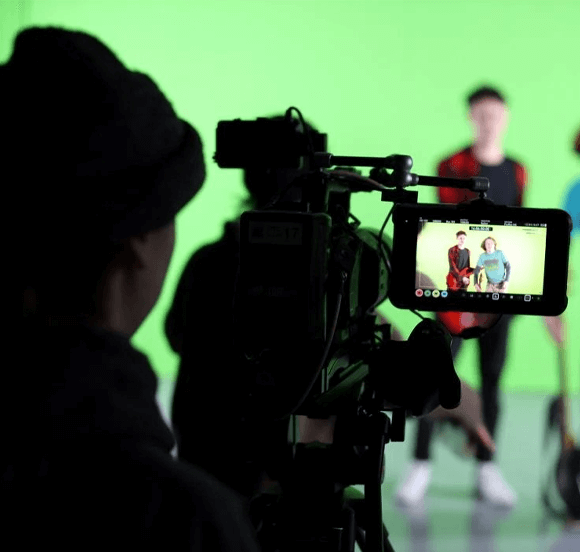

"What I love most about studying Journalism at Roehampton is the creative freedom it offers. It’s a field that allows me to explore my ideas and approach storytelling in unique ways. This freedom has been incredibly empowering and has helped me develop my voice as a journalist.
Roehampton has been instrumental in helping me move closer to my career goals. One highlight was being accepted onto the Royal Television Society Scheme, where I connected with leading industry professionals. It’s opportunities like these that make a huge difference in a competitive field like journalism."
Elaysha Smith, Journalism student
Learning and assessment
Your modules and your assessments have been developed in association with the Professional Publishers Association. This is a professionally-focused degree, where your studies replicate real-life situations and projects.
How you'll learn
You’ll learn through hands-on, collaborative projects that reflect real journalistic practice.
In small teams and individually, you’ll work on everything from news stories to full magazines and multimedia packages, building the kind of portfolios produced across today’s global digital industries. By taking on these real-world tasks, you’ll develop the essential reporting, production, and storytelling skills journalists and other media professionals use every day.
You will be taught by seasoned academics from different parts of the world, each with extensive industry experience at the BBC, Reuters (the world's largest international multimedia news provider), the Financial Times, and more. We also bring professional journalists and newsmakers to the campus to participate in workshops and advise students on their projects and career options.
You’ll learn in computer rooms designed to replicate modern media newsrooms, creating a fast-paced, professional environment. You'll also build your confidence with AI, developing skills, literacies, and ethical awareness around emerging tools, including generative AI. These are taught by staff researching AI and journalism education.
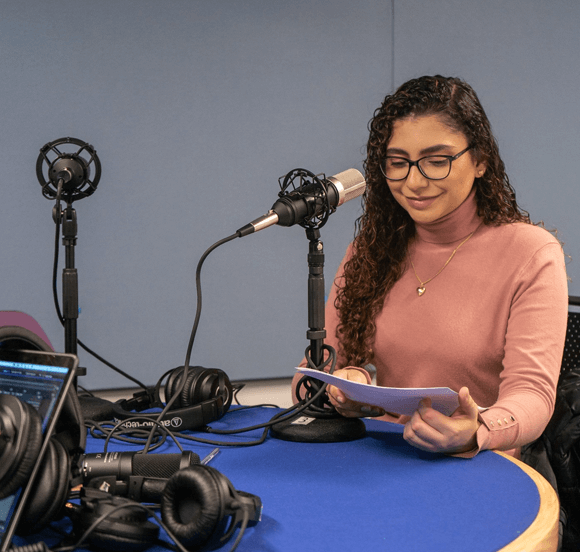
How you’ll be assessed
Prepare for your future with assessments that mirror real-world challenges and receive guidance from industry professionals.
This includes:
- Learning by doing, creating media content on topics that interest you
- Creating your own original content, aiming for a standard that could be published
- Producing features, podcasts, videos, websites, multimedia packages, social media content and magazines
These assessments help you build a professional portfolio that showcases your strengths to future employers. In addition to content creation, you’ll be assessed on your ability to analyse the impact of journalism and media on different communities and individuals.
Open days
Get a real taste of our campus, community and what it’s like to study at Roehampton
Applying
Full-time UK undergraduate students apply through UCAS.
Entry tariff
112–128 UCAS points (or equivalent)
Foundation Year: 64–80 UCAS points (or equivalent)
Looking to work out your UCAS points or find out about our entry requirements? Find out more.
When we consider applications to study with us, we form a complete view of your achievements to date, and future potential, and can offer flexibility in entry requirements. Find out more about our Contextual Offer scheme.
Specific entry requirements
An A-Level in a Humanities-related subject is preferred, but not essential.
General entry requirements
International undergraduate students apply through our direct application system.
Entry tariff
112–128 UCAS points (or equivalent)
International Foundation Pathway:
64 UCAS (or equivalent)
IELTS: 5.5
Looking to work out your UCAS points or find out about our entry requirements? Find out more.
When we consider applications to study with us, we form a complete view of your achievements to date, and future potential, and can offer flexibility in entry requirements. Find out more about our Contextual Offer scheme.
Specific entry requirements
An A-Level in a Humanities-related subject is preferred, but not essential.
General entry requirements
Fees and funding
UK students
Tuition fees
| Entry date | Undergraduate Year 1 | Undergraduate Foundation Year |
|---|---|---|
| September 2026 | £9,790 | £TBC |
Prices shown are for the first year of your degree.
Funding your studies
We also provide other ways to support the cost of living, including on-campus car parking, hardship support and some of the most affordable student accommodation and catering in London.
International students
Tuition fees
| Entry date | Undergraduate Year 1 | Undergraduate Foundation Year | International Foundation Pathway |
|---|---|---|---|
| September 2026 | £17,628 | £17,628 | £17,628 |
| January 2027 | – | – | £17,628 |
Prices shown are for the first year of your degree.
Funding your studies
We also provide other ways to support the cost of living, including on-campus car parking, hardship support and some of the most affordable student accommodation and catering in London.


